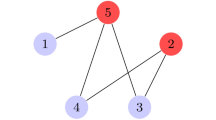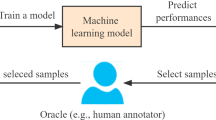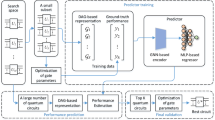Abstract
Variational quantum algorithms (VQAs) have been proposed for most of the applications that researchers have envisioned for quantum computers and appear to be the most promising strategy for quantum advantage on NISQ devices. The performance of VQAs largely depends on the structure of the quantum circuit. Manual design of a quantum circuit is time-consuming and requires human expertise. Quantum architecture search (QAS) algorithms aim to automate the design of quantum circuits in VQAs using classical optimization algorithms. However, the search space of QAS algorithms increases exponentially with the number of quantum gates. It is difficult and requires a lot of computing resources to find out an optimal circuit in such a large space by classical optimization algorithms. In this paper, we propose a space pruning algorithm, which can largely reduce the search space by progressively removing unpromising candidate gates. We use two indicators to evaluate the candidate gates (i.e., the cost-based and rotation-based indicators), and simulation result shows that the rotation-based indicator achieves a better performance than the cost-based one when they are estimated after a small number of updates on the gate parameters. The proposed method is a preprocessing method and can be used to improve the efficiency of arbitrary QAS algorithms. Simulation results show that a state-of-the-art QAS algorithm converges faster and achieves a lower cost in the pruned space than the original one.





Similar content being viewed by others
Data Availability
No data was used during the study. All codes that support the findings of this study are available from the corresponding author upon reasonable request.
References
V. Akshay, H. Philathong, M.E. Morales, J.D. Biamonte, Reachability deficits in quantum approximate optimization. Phys. Rev. Lett. 124(9), 090–504 (2020)
S. Carbonnelle, C. De Vleeschouwer, Layer rotation: a surprisingly powerful indicator of generalization in deep networks? ar**v:1806.01603 (2018)
M. Cerezo, A. Arrasmith, R. Babbush, S.C. Benjamin, S. Endo, K. Fujii, J.R. McClean, K. Mitarai, X. Yuan, L. Cincio, et al. Variational quantum algorithms. Nature Reviews Physics pp. 1–20 (2021)
M. Cerezo, A. Sone, T. Volkoff, L. Cincio, P.J. Coles, Cost-function-dependent barren plateaus in shallow quantum neural networks. ar**v:2001.00550 pp. ar**v–2001 (2020)
D. Chivilikhin, A. Samarin, V. Ulyantsev, I. Iorsh, A. Oganov, O. Kyriienko, Mog-vqe: Multiobjective genetic variational quantum eigensolver. ar**v:2007.04424 (2020)
L. Cincio, K. Rudinger, M. Sarovar, P.J. Coles, Machine learning of noise-resilient quantum circuits. PRX Quantum 2(1), 010–324 (2021)
L. Cincio, Y. Subaşı, A.T. Sornborger, P.J. Coles, Learning the quantum algorithm for state overlap. New J. Phys. 20(11), 113–022 (2018)
C. Cirstoiu, Z. Holmes, J. Iosue, L. Cincio, P.J. Coles, A. Sornborger, Variational fast forwarding for quantum simulation beyond the coherence time. npj Quantum Inf. 6(1), 1–10 (2020)
B. Commeau, M. Cerezo, Z. Holmes, L. Cincio, P.J. Coles, A. Sornborger, Variational hamiltonian diagonalization for dynamical quantum simulation. ar**v:2009.02559 (2020)
G.E. Crooks, Gradients of parameterized quantum gates using the parameter-shift rule and gate decomposition. ar**v:1905.13311 (2019)
Y. Du, T. Huang, S. You, M.H. Hsieh, D. Tao, Quantum circuit architecture search: error mitigation and trainability enhancement for variational quantum solvers. ar**v:2010.10217 (2020)
E. Farhi, D. Gamarnik, S. Gutmann, The quantum approximate optimization algorithm needs to see the whole graph: a typical case. ar**v:2004.09002 (2020)
H.R. Grimsley, S.E. Economou, E. Barnes, N.J. Mayhall, An adaptive variational algorithm for exact molecular simulations on a quantum computer. Nat. Commun. 10(1), 1–9 (2019)
A.W. Harrow, J.C. Napp, Low-depth gradient measurements can improve convergence in variational hybrid quantum-classical algorithms. Phys. Rev. Lett. 126(14), 140–502 (2021)
Z. He, C. Chen, L. Li, S. Zheng, H. Situ, Quantum architecture search with meta-learning. ar**v:2106.06248 (2021)
Z. He, L. Li, S. Zheng, Y. Li, H. Situ, Variational quantum compiling with double q-learning. New J. Phys. 23(3), 033–002 (2021)
K. Heya, K.M. Nakanishi, K. Fujii, Subspace variational quantum simulator. ar**v:1904.08566 (2019)
K. Heya, Y. Suzuki, Y. Nakamura, K. Fujii, Variational quantum gate optimization. ar**v:1810.12745 (2018)
O. Higgott, D. Wang, S. Brierley, Variational quantum computation of excited states. Quantum 3, 156 (2019)
Y. Hu, Y. Liang, Z. Guo, R. Wan, X. Zhang, Y. Wei, Q. Gu, J. Sun, Angle-based search space shrinking for neural architecture search. In: European Conference on Computer Vision, pp. 119–134. Springer (2020)
P.D. Johnson, J. Romero, J. Olson, Y. Cao, A. Aspuru-Guzik, Qvector: an algorithm for device-tailored quantum error correction. ar**v:1711.02249 (2017)
T. Jones, S.C. Benjamin, Quantum compilation and circuit optimisation via energy dissipation. ar**v:1811.03147 (2018)
T. Jones, S. Endo, S. McArdle, X. Yuan, S.C. Benjamin, Variational quantum algorithms for discovering hamiltonian spectra. Phys. Rev. A 99(6), 062–304 (2019)
A. Kandala, A. Mezzacapo, K. Temme, M. Takita, M. Brink, J.M. Chow, J.M. Gambetta, Hardware-efficient variational quantum eigensolver for small molecules and quantum magnets. Nature 549(7671), 242–246 (2017)
S. Khatri, R. LaRose, A. Poremba, L. Cincio, A.T. Sornborger, P.J. Coles, Quantum-assisted quantum compiling. Quantum 3, 140 (2019)
E.J. Kuo, Y.L.L. Fang, S.Y.C. Chen, Quantum architecture search via deep reinforcement learning. ar**v:2104.07715 (2021)
U. Las Heras, U. Alvarez-Rodriguez, E. Solano, M. Sanz, Genetic algorithms for digital quantum simulations. Phys. Rev. Lett. 116(23), 230–504 (2016)
L. Li, M. Fan, M. Coram, P. Riley, S. Leichenauer et al., Quantum optimization with a novel gibbs objective function and ansatz architecture search. Phys. Rev. Res. 2(2), 023–074 (2020)
R. Li, U. Alvarez-Rodriguez, L. Lamata, E. Solano, Approximate quantum adders with genetic algorithms: an ibm quantum experience. Quantum Measurements Quantum Metrol. 4(1), 1–7 (2017)
Y. Li, S.C. Benjamin, Efficient variational quantum simulator incorporating active error minimization. Phys. Rev. X 7(2), 021–050 (2017)
J.R. McClean, S. Boixo, V.N. Smelyanskiy, R. Babbush, H. Neven, Barren plateaus in quantum neural network training landscapes. Nat. Commun. 9(1), 1–6 (2018)
J.R. McClean, M.E. Kimchi-Schwartz, J. Carter, W.A. De Jong, Hybrid quantum-classical hierarchy for mitigation of decoherence and determination of excited states. Phys. Rev. A 95(4), 042–308 (2017)
K.M. Nakanishi, K. Mitarai, K. Fujii, Subspace-search variational quantum eigensolver for excited states. Phys. Rev. Res. 1(3), 033–062 (2019)
M. Ostaszewski, E. Grant, M. Benedetti, Structure optimization for parameterized quantum circuits. Quantum 5, 391 (2021)
M. Ostaszewski, L.M. Trenkwalder, W. Masarczyk, E. Scerri, V. Dunjko, Reinforcement learning for optimization of variational quantum circuit architectures. ar**v:2103.16089 (2021)
A. Peruzzo, J. McClean, P. Shadbolt, M.H. Yung, X.Q. Zhou, P.J. Love, A. Aspuru-Guzik, J.L. Obrien, A variational eigenvalue solver on a photonic quantum processor. Nat. Commun. 5(1), 1–7 (2014)
J. Preskill, Quantum computing in the nisq era and beyond. Quantum 2, 79 (2018)
A.G. Rattew, S. Hu, M. Pistoia, R. Chen, S. Wood, A domain-agnostic, noise-resistant, hardware-efficient evolutionary variational quantum eigensolver. ar**v:1910.09694 (2019)
K. Sharma, S. Khatri, M. Cerezo, P.J. Coles, Noise resilience of variational quantum compiling. New J. Phys. 22(4), 043–006 (2020)
S. Sim, P.D. Johnson, A. Aspuru-Guzik, Expressibility and entangling capability of parameterized quantum circuits for hybrid quantum-classical algorithms. Adv. Quantum Technol. 2(12), 1900070 (2019)
R.P. Singh, A. Mandilara, Quantum compiling on locally adjusted circuits of designated architecture. ar**v:1908.03994 (2019)
X. Xu, S.C. Benjamin, X. Yuan, Variational circuit compiler for quantum error correction. Phys. Rev. Appl. 15(3), 034–068 (2021)
X. Yuan, S. Endo, Q. Zhao, Y. Li, S.C. Benjamin, Theory of variational quantum simulation. Quantum 3, 191 (2019)
S.X. Zhang, C.Y. Hsieh, S. Zhang, H. Yao, Differentiable quantum architecture search. ar**v:2010.08561 (2020)
S.X. Zhang, C.Y. Hsieh, S. Zhang, H. Yao, Neural predictor based quantum architecture search. Mach. Learn.: Sci. Technol. 2(4), 045–027 (2021)
Y.H. Zhang, P.L. Zheng, Y. Zhang, D.L. Deng, Topological quantum compiling with reinforcement learning. Phys. Rev. Lett. 125(17), 170–501 (2020)
Acknowledgements
This work is supported by Guangdong Basic and Applied Basic Research Foundation (Nos. 2021A1515012138, 2019A1515011166, 2020A1515011204), Key Platform, Research Project of Education Department of Guangdong Province (No. 2020KTSCX132), Key Research Project of Universities in Guangdong Province(No. 2019KZDXM007), the National Natural Science Foundation of China (Nos. 61802061, 61972091), the Cross Project of Foshan University (No. 2019xw104).
Author information
Authors and Affiliations
Corresponding author
Rights and permissions
About this article
Cite this article
He, Z., Su, J., Chen, C. et al. Search space pruning for quantum architecture search. Eur. Phys. J. Plus 137, 491 (2022). https://doi.org/10.1140/epjp/s13360-022-02714-7
Received:
Accepted:
Published:
DOI: https://doi.org/10.1140/epjp/s13360-022-02714-7




